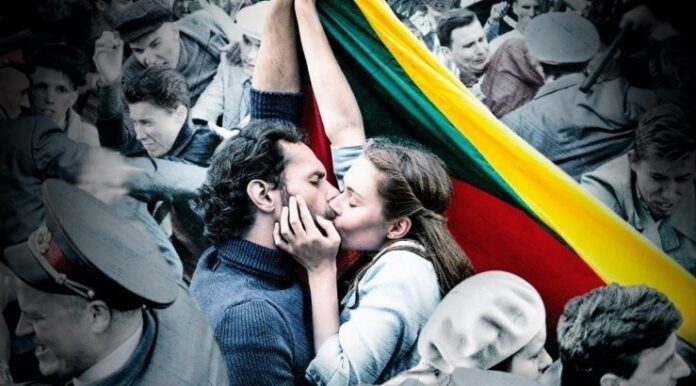
Europos sąjungos filmų festivalyje 2017 Toronte matėme ir lietuvišką meninį kino filmą „Emilija iš Laisvės alėjos.”
Lietuviškas filmas turėjo didelį pasisekimą. Royal Cinema kino teatro 400 vietų salė buvo užpildyta; beveik 100 žiūrovų liko už durų. Buvo ne tik čia, Kanadoje, gimusių lietuvių, bet ir daug naujai atvykusių, jaunesnių žiūrovų ir daugiau kaip trečdalis – ne lietuvių.
Filmo turinys – nelengva istorija apie 1973 metų Kauno įvykius ir jų atgarsį jaunimo gyvenime, bet nepaprastai profesionaliai pristatytas. Žiūrovai buvo labai teigiamai nustebinti.
Po seanso filmo kūrėjai ir festivalio organizatoriai mielai atsakė į žiūrovų klausimus, niekas neskubėjo išeiti, visi liko pasiklausyti.
Rasa Kurienė
Skaitykite Tomo Trussow šio filmo peržiurą:
Film Review: Donato Ulvydo „Emilija iš Laisvės alėjo”
The Toronto European Union Festival, now in its thirteenth year, is one of the hidden gems of Toronto’s entertainment culture. Much smaller than festivals like TIFF, and housed in only one venue—the cozy Royal Cinema on College Street—it nevertheless has the benefit of being free to the public. Thanks to a generous set of sponsors, films from countries all across the EU are brought to Toronto (usually the only time they’ll ever screen there), and all anyone has to do is line up outside the theatre to see them.
Unsurprisingly, Toronto’s Lithuanian community came out in full force for 2017’s Lithuanian offering, Donatas Ulvydas’ Emilija. Despite the chilly November evening and the flecks of snow that began to fall, the line was long enough to wrap around the side of the cinema—and some feared there wouldn’t be enough room for everyone. It was a fear that was later confirmed, for after a halfhour delay, it was announced that about 100 people were denied entry into the full theatre (though they were promised a second screening at a later date). It was, by all accounts, one of the most popular Lithuanian screenings in the festival’s history.
It’s easy to imagine why: the film is quite engaging as a time capsule back to the 1970s, when Lithuanians were still in the grip of Soviet control. Telling the story of the young Emilija (Ieva Andrejevaitė), an idealistic country girl who travels to Kaunas to train as an actress, Ulvydas examines the patriotic power of the indomitable Lithuanian spirit with great clarity and control. Basing elements of his story on the life of former theatrical director Jonas Jurašas (who was the artistic director of the Kaunas State Drama Theatre during the period the film depicts) and the writings of partisan poet Justinas Marcinkevičius, he weaves a convincing tableau of splintered lives and compromised visions, and the greatest strength of Emilija is how deeply he makes us care for the people at its heart.
Because the Lithuanian film industry is small, generally underfunded, and brimming with theatrically-trained actors, the performances admittedly do lack some nuance, and the production values are adequate but not extraordinary. The camerawork involves a lot of handheld shooting, which can leave a queasy feeling for those unused to such visual unsteadiness, and the score plays to the rafters—and then some. One can also argue the men in this film, such as the obdurate theatre director (Darius Gumauskas) and the conflicted KGB agent who stalks Emilija (Tauras Čižas), are more fleshed out as characters than Emilija herself, who serves a more symbolic function.
Still, as a slice of history that recalls a miserable time in Lithuania’s history, this film doesn’t soften any of the blows. It even opens by recreating the graphic self-immolation of Romas Kalanta, the student protester whose death kicked off a year of civil unrest. While Emilija herself did not exist as a person, one can still imagine others like her finding themselves on the path of resistance, and that type of verity is what makes „Emilija” a compelling watch in spite of its relative unevenness.
From the tone of the room, I believe the audience largely felt the same way. Ulvydas received a generous applause before taking questions from the audience, memorably telling everyone in attendance that “Freedom is not a gift.” Because 2018 is the centenary of Lithuanian independence, he told us that it was especially important to remember the costs that came with independence: how so many sacrifices were made, and lives ruined. I was rather amused by his admission that he had no ulterior motive for making „Emilija,” other than a desire to flex his dramatic muscles after making a string of comedies. I’m so used to hearing film directors pursue projects for personal reasons, so it was refreshing to hear an answer so unexpected.
Watching „Emilija,” however, you wouldn’t know Ulvydas had a reputation based in comedies. His territorial shift is a convincing one, and I have no doubt that, after the massive show of support „Emilija” had, he will return to Toronto with his next offering in the near future. And we will be eagerly awaiting him.
Tomas Trussow


























